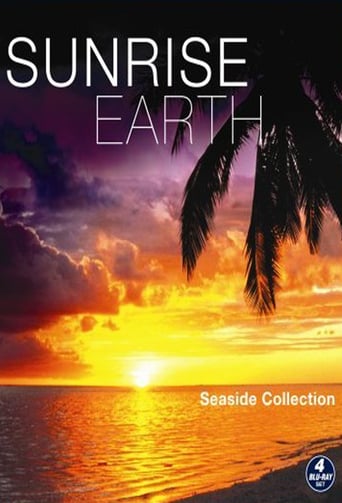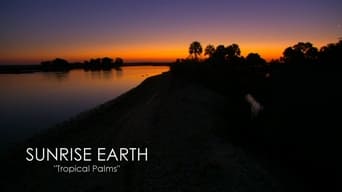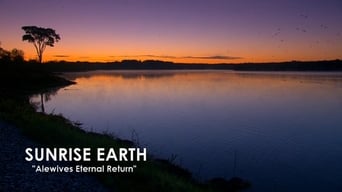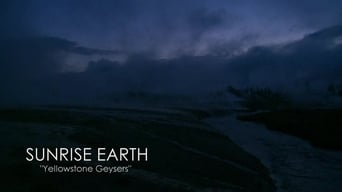Sunrise Earth Season 1
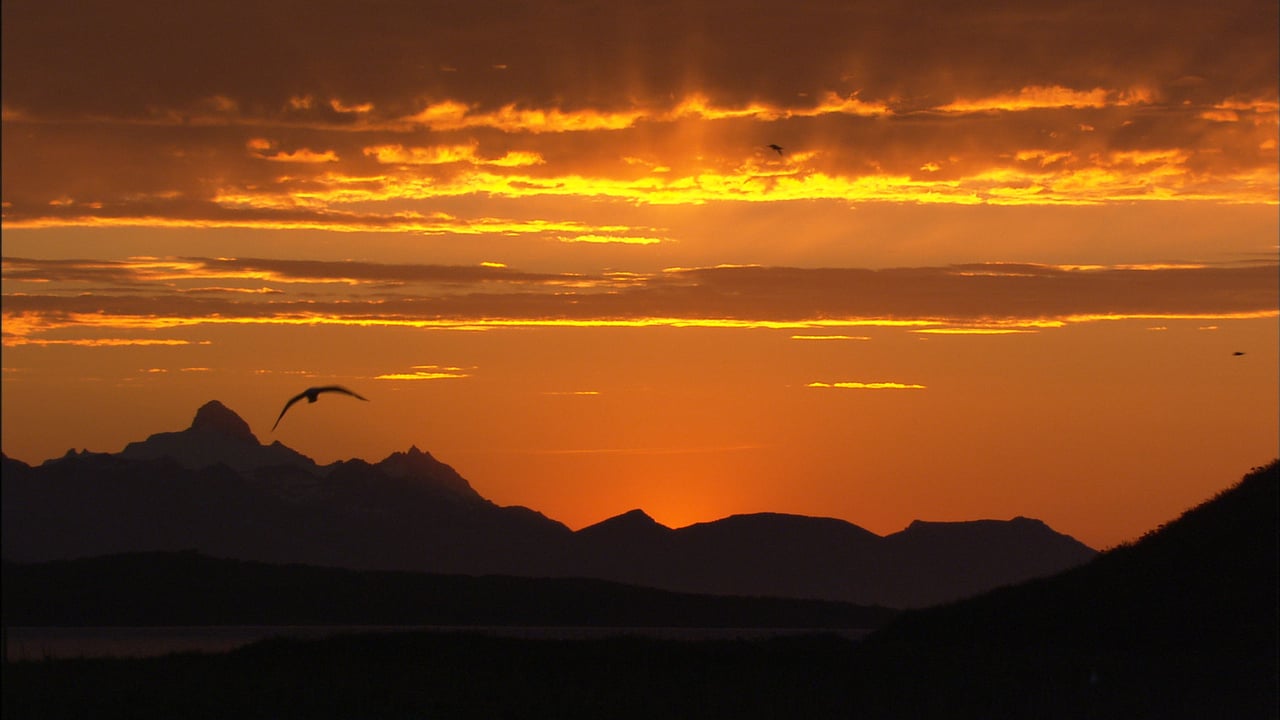
Sunrise Earth is a nature documentary television series featuring hour-long episodes that aired in the United States on Discovery HD Theater, now renamed HD Theater. The series focuses on presenting the viewer with sunrises in various geographical locations throughout the world. It is also notable for its complete lack of human narration, concentrating instead on the natural sounds of each episodes' specific location. High-definition video images and Dolby 5.1 stereo surround sound are used to present each natural environment in a clear and detailed manner. The show is an example of the genre known as "Experiential TV", developed by series creator David Conover. The technique has been described by TV critic Tom Shales as "crazily uneventful and thoroughly wonderful."
Watch NowWith 30 Day Free Trial!
Sunrise Earth
2004
Sunrise Earth is a nature documentary television series featuring hour-long episodes that aired in the United States on Discovery HD Theater, now renamed HD Theater. The series focuses on presenting the viewer with sunrises in various geographical locations throughout the world. It is also notable for its complete lack of human narration, concentrating instead on the natural sounds of each episodes' specific location. High-definition video images and Dolby 5.1 stereo surround sound are used to present each natural environment in a clear and detailed manner. The show is an example of the genre known as "Experiential TV", developed by series creator David Conover. The technique has been described by TV critic Tom Shales as "crazily uneventful and thoroughly wonderful."
Watch Trailer
With 30 Day Free Trial!
Sunrise Earth Season 1 Full Episode Guide
This program records the events of one total solar eclipse, that of March 29th, 2006 as it happens in two locations on the planet. We travel to Natel, Brazil (at the beginning of the eclipse) and observe a group of fishermen and wild native species along an open stretch of beach. We then shift to Antalya, Turkey (for the mid-point of the eclipse) and observe a peaceful village as the moon makes it's way across the sun. ** Possible duplicate of 1x52 **
The sun jumps directly into the sky at the Tropic of Capricorn.
Seven miles off the Irish coast stands a pair of imposing rocks known as Little Skellig and Skillig Michael, where early morning light sihouettes stone huts called "beehives" built by monks.
Venice, Italy Many have called this Old World maritime center the most beautiful city on earth. Millions visit each year, attracted by the image of a romantic sunset serenade on a gondola while dreamily floating down on the Grand Canal. Dawn offers its own distinctive window into this city's character, long before the gondolas awake. This episode departs from the fixed vantage points of past Sunrise Earth shows. For the first time, we take a voyage by slow-moving boat. We do our best to get lost within the 28 miles of the Venetian canal system. A mesmerizing passage into the Cannaregio district reveals the lesser-known beauty behind the city's famous glitz. Workboats slip under low bridges and their even lower hanging verdant plants. Cool yellows and pinks catch the morning sun and betray the Santa Maria dei Miracoli and some of the world's finest marble stonework. Window shutters are opened by sleepy-eyed Italians, startling the pigeons, which roost along the narrow waterways at night. We silently pass the sites where famous Venetians once awoke each day; such as the great Renaissance painter Tintoretto and the Orient explorer Marco Polo. Fishermen motor by, on their way to the open air market in the Rialto, with over 100 varieties of fish. Caught amidst the tension of the moving and the still, the beauty of Venice is sustained for another day.
The dawn activities of wildlife in northern Vancouver.
The Svalbard group of islands in the Arctic Ocean about midway between Norway and the North Pole.
The Arches National Park in Utah
The Ritsurin Garden in Takamatsu City.
Dawn pierces a lavender sky on the South Island of New Zealand. We are alongside a serene glacial lake in the Southern Alps, called Lake Wakatipu, and are entirely ringed by looming mountains. These high ranges betray the story of the collision of continental plates as schist "tors" border spires of metamorphic rock. It is a storybook vista. In fact, the beech forests along the lake were filmed for "The Lord of the Rings." At lake level, delicate hoarfrost nightly coats grasses and plants. As the sun ascends, light sparks in a fairyland of ice crystals. The indigo sky blooms into yellow dawn. Warmth invades the braided river system of shallow sandbars and flats, as paradise shelducks graze on clover and weed seeds. The shy dunnock or hedge sparrow pecks among the pebbles. Hoarfrost melts in the rising sun - a winter's day begins, at the bottom of the world - in "Middle Earth."
Sunrise over Huahine includes a rainbow.
Hakeakala volcano, though large and potentially deadly, is one of the most peaceful places on earth.
Scientists are interviewed as an examination of the sun and its impact on the Earth and its inhabitants.
Polar bears congregate in Cape Churchill, Manitoba in Canada.
The life-cycle of a solar eclipse and how it affects the world below.
A holiday-themed show featuring the last hours of sunlight, instead of the first. Locations across the United States are highlighted, from New York to Alaska.
The largest colony of Magellanic penguins in the world welcomes a new day near Punta Tomba, Argentina.
The center of the Incan empire, Machu Picchu in Peru, is shown as the sun rises on this city high in the Andes Mountains
Tambopata, Peru Two hundred feet high in the canopy of Peruvian rainforest, a pink and distant light encroaches. The dense forest holds the dawn air. Birds sing alone, together - a purple-throated cotinga, then a distant flycatcher. Butterflies gather nectar. The high canopy teems with insects - oblivious as the sun ascends. Rosy light splashes the sky. The sun pushes its way into the forest. A blue-headed parrot busies herself collecting twigs for her nest. A cobalt-winged parakeet pulls at the white seed masses of a kapok tree - feeding and pollinating at the same time. As the sun rises overhead, we slowly descend into the tangled under story. Orchids and epiphytes bob in the moist air. Complex partnerships between insects, birds and plants play out amongst an eden of species. Aricaris - brown mandibled and curl-crested toucans - chase insects. Descending farther, we land on the forest floor amongst broad-leaved plants and a nation of insects - lines of foraging ants, wandering ground beetles, a jumping spider. The fervent life of the rainforest is revealed in a slow drift downwards to the forest floor.
Day breaks in a slice of red over the Southern Atlantic Ocean Península Valdés, Argentina and a colony of southern elephant seals and its new pups.
A geyser in Iceland is shown in the first morning sunlight.
The sun rises on a port in Antalya, Turkey and the lighthouse in Alexandria, Egypt.
The Salisbury Plain in the United Kingdom is the site of one of the most recognizable structures in the world. Stonehenge is thought to be a sun-based calendar, so it's only fitting for a sunrise to be recorded here.
The sun casts its light on a farming village in Aspendos, Turkey.
A new day comes to Gullfoss, Iceland. Sunrise: Nature's alarm clock for the land, the sea, and the myriad of creatures who call our planet home. Accompany us on a tranquil journey into the landscape itself as we enjoy the sights and the ambient sounds associated with the first light of a new day.
Morning exercises similar to Tai Chi in Elephant Trunk Park in Guilin, China.
Siem Reap, China Every culture has its own connection to the natural world at dawn. In Siem Reap, Cambodia, the chants of monks echo from within a Theravada Buddhist monastery, called a "wat." These chants help start the day by focusing the monks' attention. Potential distractions are many. Unlike the cloistered monastic retreats of the west, the Wat Svay compound is at the community hub, at its central cross-road. Yet despite busy human activity, the peaceful influence and presence of the natural world remains near for the focused mind. A vibrant pigeon roost is found on the pagoda's rooftop, amidst ornamental carvings that depict serpent figures called "nagas," protectors from the earth. School children wander among the votive "stupas," maintaining the grounds. And as the monks honor their lineage of spiritual teachers, a spectacular rainbow reveals itself high over the temple. One last little know fact…a rainbow at sunrise will always have a steeper arc than any rainbow that happens near mid-day.
Frogs, spiders, and birds wake to the morning sun on a terraced farm near PingAn, China. Take in the morning activities of the Dragon's Backbone, a stunning sixty-six square kilometers of crop terraces hand-cultivated by 800 farmers that snake up over a thousand feet of vertical altitude. These are marks of the Zhuang people.
Trained Cormorants catch fish for fishermen on the Li River near Xingping, China.
The temples of Angkor in Cambodia are lit by the rising sun.
The moon sinks into the ocean in the Marino Las Baulas National Park in Guanacaste, Costa Rica.
La Paz River, Vara Blanca, Costa Rica — The crater lake of the Poas Volcano drains from 9,000 feet into this high altitude cloudforest ravine. Stepping downward through a series of five waterfalls, we descend as the sun rises. Rays of light catch suspended water particles from the falling water, as green threads of life cling to sodden cliff walls. From within its pupa, an owl butterfly emerges with the increasing warmth of day, pumping fluid into its silken wings. Through the last rock opening, the water and sun burst out and down towards a restful pool, the famous La Paz waterfall.
A wide variety of birds mingle in the Tempisque Basin of Costa Rica's Palo Verde National Park.
The National Park of Tikal in Guatemala is home to Mayan Pyramids, where howler monkeys, parrots, and toucans welcome the new day.
Perched in the dawn hours along the terminal moraine of Kenai Fjords National Park's largest tidewater glacier are blue icebergs flowing toward the sea. Scattered on the jet-black beach are other bergs broken under the pressure of a four-mile river of ice.
Fog envelopes Beluga Lake in Homer, Alaska, but dissipates as the sun rises and seaplanes take to the sky.
After seven months of hibernation, the world's largest population of brown bears is ready for some sun in the Katmai National Park and Preserve, Alaska. They begin the morning in the meadow, but as the sun rises and the tide goes out, the bears dig for clams in the flats.
Western U.S. — Crossing the North American continent in a scant four hours, dawn settles on the Great Plains, the Rocky Mountains, and the coastal ranges and beaches of California before departing the western shore. We witness the geo-dramas of Yellowstone geysers, herds of horses and bison on the open range, the spectacular lighting of the Teton Range. Then in California, we see the massive sequoia, tule elk, a rainbow of wildflowers, the Yosemite Valley, and elephant seals on the beach. These are the great sunrise moments in nearly a dozen morning ecosystems of the west.
Eastern U.S. — The sun hits the Atlantic seaboard five hours after the western coast of Europe, and a wide range of habitats begin the shift from the nocturnal to the heat and light of day. We observe the changes, as naturalists, from the sub-tropical ecosystem of the Everglades to the northern lakes of New England, from the very first light atop Cadillac Mountain in Maine to the sabal palms of the Gulf of Mexico. These are great sunrise moments in nearly a dozen morning ecosystems of the East.
Cadillac Mountain, Acadia National Park, Maine — At 1,532 feet, this is the highest vantage point along the North Atlantic seaboard. During certain times of year, the summit receives the rays of the first rising sun within the United States. The pea, composed of pink granite, is perched above a forest of spruce and pitch pine. Among the granite slabs are tiny sub-alpine plants such as cinquefoil, squat, gnarled trees, wild blueberries and various sized boulders. The view of the Maine archipelago is unsurpassed, with the Cranberry Islands foremost in the southwest.
The Homosassa Spring on the Gulf coast of Florida is home to West Indian manatees.
Schwabacher's Landing, Moose, Wyoming — The nocturnal beavers have settled into a small tributary under the sheer cirque walls, rugged ridges and jagged peaks of the Teton Range. Their engineering skill has produced an 8-foot high dam and a new pond for those creatures of the day: a great blue heron fishing in the morning mist, ducks with their ducklings, trout, and a goldfinch feeding her chick. We witness these two communities as they pass each other during the crossroad of dawn.
The sun rises over the incoming waves on the Atlantic coast at Coast Guard Beach at the Cape Cod National Seashore in Massachusetts.
Watch Tule elk at sunrise in the Tule Elk Preserve in California.
Pahayokee, Everglade National Park, Florida. Savannah-like open sawgrass prairie stretches as far as the eye can see, punctuated by the occasional cypress tree. Beneath the apparent prairie, however, is a wide river flowing at a speed of more than one mile per hour. It's Marjorie Stoneham Douglas' famous "River of Grass." In fact this exact Pahayokee platform was this writer's most frequented Everglade destination. To better observe the workings of the underwater world, we submerge a camera and peer directly into the lives of mosquito fish and the enriching mat-like algae known as periphyton. Insects traverse the razor sharp strands of grass as the weather changes.
The Triangle X Ranch in Moose, Wyoming welcomes the new day as horses graze in the pasture and geese pass overhead.
Lobster fishermen begin their day in New Harbor, Maine
Elephant seals crawl up the beach at California's Point Reyes National Seashore to soak up the first drops of sunshine at this seal colony at Chimney Point, California. Elephant seals play in the water after a hunt, and tule elk wander in a meadow.
Giant sequoias welcome the sun in Sequoia National Park in California
Early morning on the Penobscot River in Maine.
Dawn in Yosemite National Park.
Sunrise over a sea cave full of young anemones and coralline algae.
Fisherman enjoy daybreak off the coast of Florida.
Alewives make the dangerous trek from the freshwater lakes of New England to the Atlantic Ocean.
Hot air balloons fly over Vermont's Green Mountains.
A colony of terns watches the sun rise in the Monomoy National Wildlife Refuge in Chatham, Massachusetts. This is the second-largest colony of terns on the Atlantic coast, with over 17,000 birds
Bison awaken and graze in Yellowstone National Park.
Alligators, egrets, wood storks and ravens enjoy the first rays of sunshine from a gator hole in the Everglades National Park.
Sunrise in Yellowstone National Park in Wyoming. Locations include Black Sands Basin, Firehole River, Midway Geyser Basin, Lower Geyser Basin, and Riverside Geyser
The sun rises as moose graze in Kidney Pond in Maine, under the shadow of the 4,000 ft. peak of Katahdin Mountain
Free Trial Channels
Seasons


